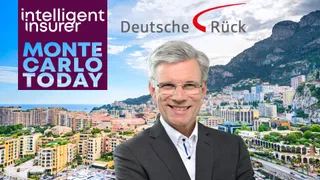
CEO urges vigilance as warming seas set to reshape climate change insurance
On the shores of Monte Carlo, an invisible storm is brewing. Achim Bosch, CEO of Deutsche Rück, warns that the warming Mediterranean is reshaping risk in ways the industry can no longer ignore.
Key points:
Warming seas intensify losses
Profitability over diversification
Long-term partnerships prioritised
“It’s not about a surge in the number of events,” Bosch explained, “but when those infamous VB weather conditions, also known as Genoa low, occur in a warmer atmosphere, we see more intense rainfall and destructive flooding.”
The consequences extend far beyond southern Europe. Warmer sea surface temperatures are driving higher losses with volatile weather patterns sweeping north to Eastern Europe and even back to Germany, where Deutsche Rück faces its largest exposure.
Climate change is no longer a theoretical challenge; it’s actively reshaping the insurance landscape. “Every update to risk models must account for climate change,” Bosch emphasised.
“It’s not a dramatic, overnight shift but a gradual, smooth transition with key parameters shifting year by year due to climate risk.” This reality demands constant vigilance and adaptation, areas where Deutsche Rück excels, thanks to its approach to modelling natural hazards in Germany.
“We’ve developed our own four proprietary models, for winter and summer storms, floods, earthquakes, which gives us a significant edge in the German market,” Bosch said, contrasting this with competitors who relied on third-party models. Built on decades of homeowners’ insurance data and strengthened by partnerships with scientific institutions, these models are continuously refined. “Carefully dealing with NatCat risks and continuously building up our knowledge and tools based on our extensive data pool, is embedded in our operations since our founding in 1951. It is part of our DNA,” he added.
“Diversification supports capital efficiency, but it’s no substitute for profitability.”
In international markets, where data can be less robust, Deutsche Rück combines vendor models with its own expertise. “Our team’s deep experience allows us to critically evaluate external risk models and integrate our own risk perspective into pricing,” Bosch explained.
This disciplined approach extends to underwriting and capital management, where profitability is non-negotiable. “We’re not growing just for the sake of growth,” he stated. “It’s about stabilising and sustaining profitability.”
Bosch rejects the notion that diversification alone can justify unprofitable business. “Diversification supports capital efficiency, but it’s no substitute for profitability,” he said.
This philosophy, combined with its ownership structure, allows Deutsche Rück to take a long-term view, free from the short-term pressures listed companies face. “Our divisions aren’t chasing quarterly targets,” Bosch explained. “They can select segments with sustainable margins, manageable volatility and the potential for enduring client partnerships.”
Central to this strategy is Deutsche Rück’s focus on small and medium-sized insurers, built on mutual trust and respect. “It may not seem like the most modern approach, but it suits us,” Bosch said. These relationships, rooted in tradition, trace back through Germany’s public insurers, who founded Deutsche Rück 74 years ago. This legacy, combined with an A+ financial rating, makes the company a trusted partner across Europe, Latin America, the Middle East and Asia.
Technology, particularly automation and AI, is another cornerstone of Deutsche Rück’s strategy. Bosch sees AI revolutionising labour-intensive tasks such as document processing. “It frees our employees from repetitive work, allowing them to focus on the more complex, engaging tasks,” he says.
Inconsistent data formats currently slow customer data processing, but Bosch is optimistic about AI’s potential to streamline operations while maintaining data quality. He also envisions AI assisting with reviewing contract clauses and wordings, tasks that today require human effort. “Speeding up these processes without sacrificing data quality is a game-changer,” he noted.
On capital management, Bosch advocates for a cautious, yet agile, approach. “Reserves from our capital management are certainly a buffer, which allows us to operate with a long-term horizon in a volatile capital market.”
This mindset extends to retrocession, where the growing severity of natural hazards, driven by climate change, demands careful planning. “The extremes are increasing, especially in our home market, where we face the highest volatility,” Bosch observed. Retrocession strategies must evolve to address these heightened risks.
Bosch’s message at Monte Carlo is unequivocal: climate change is a present challenge, not a future one, driving risk and opportunity and Deutsche Rück’s response is grounded in discipline – prioritising profitability, leveraging decades of modelling expertise and nurturing trust-based partnerships.
“We’re not chasing market cycles,” Bosch concluded. “We’re building sustainable growth of profits.” With climate pressures intensifying and technology reshaping operations, Deutsche Rück has developed a winning blend of tradition, innovation and rigorous risk management.
Achim Bosch is the chief executive officer, Deutsche Rück. He can be contacted at achim.bosch@deutscherueck.de
For more news from Monte Carlo Today, click here.
Did you get value from this story? Sign up to our free daily newsletters and get stories like this sent straight to your inbox.
Editor's picks
Editor's picks
More articles
Copyright © intelligentinsurer.com 2024 | Headless Content Management with Blaze

